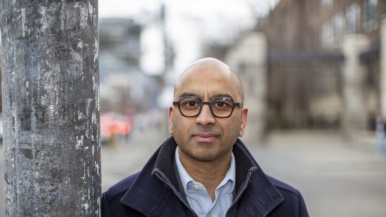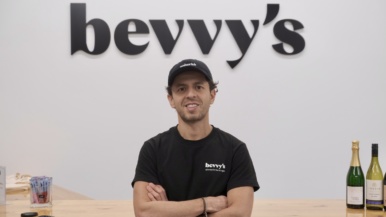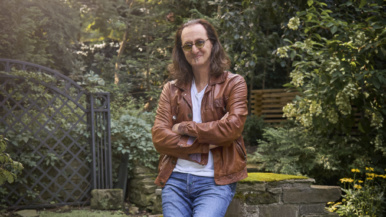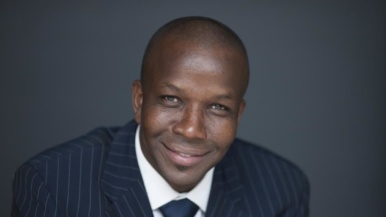Q&A: Ins Choi, the playwright whose new CBC comedy, Kim’s Convenience, premieres tonight

In 2011, Kim’s Convenience upstaged every other show at the Toronto Fringe Festival and earned the Best New Play award for its creator, Ins Choi. Five years later, the comedy—about a Korean family and their variety store in Regent Park—is the centrepiece of CBC’s fall prime-time lineup, premiering tonight at 9 p.m. (it got bumped by the Blue Jays last Tuesday), and the first Canadian TV series to feature an entirely Asian cast. We spoke to Choi about the pressure of pioneering, why Kim’s Convenience isn’t a “Korean show” and how the Asian–North American entertainment community can bury Long Duk Dong once and for all.
Kim’s Convenience is being discussed not just as a TV show, but as a great hope for Asian-Canadian artists and creators, given its portrayal of characters and stories that are usually relegated to the small-screen fringes. Does that feel like an opportunity or unfair pressure?
There’s a lot of support out there for the show because it checks off certain criteria: CanCon, diversity. But it’s still got to be good. If it’s not, it doesn’t matter what boxes are ticked. We’re very proud of the pioneering; there’s been so much talk about diversity and actors of colour being on screen and not just in the background, and about putting our money and talent where our mouth is. But I don’t like when people call it an Asian or Korean TV show. No—Korean TV shows are made in Korea. This is a Canadian TV show, made in Canada, fully funded by Canadian money. In the end, this is a show about a family. That’s who people will fall in love with.
You grew up as a first-generation Korean-Canadian with immigrant parents. To what extent does the show reflect your experience?
It’s not directly based on my experience, but I studied acting and the arts like Janet—the daughter in the show, who is a photographer—so there’s a parallel there. My dad is a great storyteller and funny, but he’s very soft spoken and not nearly as opinionated or brash as Appa, Janet’s father on the show. It’s more from my observations of my dad’s friends, the older men at church or sleeping over at the houses of friends whose families owned Korean stores.
The show has fun with stereotypes about immigrant parents, about the Korean community, about other groups. How do you draw the line between funny and offensive?
I work with other writers, so we all weigh in on a scene or an episode or a line. I think we focus on what makes us laugh. We don’t worry about offending. I don’t even think we’re having fun with stereotypes. All of my friends from church and their parents owned a convenience store, so that wasn’t a stereotype—that was a reality. It’s a stereotype if there’s a Chinese waiter with an accent who is really cheap and greedy and has two lines. But if the whole TV show is about this man, then it moves from caricature to character.

The show is set in a convenience store in Regent Park. What did you do to get the setting just right?
I encouraged our production design team to use me and my community. We went to a lot of convenience stores and my parents’ house and took a bunch of pictures. We just really wanted everything to feel authentic. There are pieces of equipment that are obviously from a different era: an old fax machine, a sign above the cooler that says “Eggs, Milk, Dairy.” Behind the counter there are things like family pictures and a worn two-dollar bill—I don’t know why, but people put those up. There’s a scene where Appa is playing a Korean card game called Hwatu with his friend at the store. They’re little red cards—our prop team was like, “What are these?” I sent them to Koreatown to buy them and taught the actors how to play. They had nothing to do with plot—they’re just playing while talking about their kids—but I think it’s something that some Koreans will notice. It adds to the authentic voice.
How does diversity on TV in Canada stack up against diversity in the States? For a country that loves to crow about its diversity, why is this the first show starring Asian actors?
I think Canada versus the States is kind of an unfair comparison. I’d guess that, in Canada, 20 shows are being developed every season, while the States would have 200 shows, so much more money and a lot more people. But I do think our show can punch its weight against any American show. We wanted to make Kim’s Convenience into a TV show way before Fresh off the Boat premiered.
Last month, Alan Yang won an Emmy for his writing on Master of None. In his speech, he pointed out that there are the same number of Asian-Americans and Italian-Americans and said, “They have The Godfather, Goodfellas, Rocky, The Sopranos. We got Long Duk Dong. We have a long way to go.” Do you relate to that statement?
I do relate, very much so. You have to remember that Mario Puzo wrote The Godfather book; Frances Ford Coppola, another Italian, said, “I love this material”; and then Al Pacino and Robert DeNiro chose to audition for and act in that movie. I don’t think we have that depth [in the Asian entertainment community] yet. I think it’s a matter of supporting the actors and creators, but it’s also about more Asian-Americans or -Canadians choosing this path. Where is the Asian-American or Asian-Canadian Pacino or Coppola?
Don’t you think maybe they’re out there, waiting for an opportunity?
I hope so. I hope I can inspire more young people to take their ideas and turn them into a reality. It’s early days.





